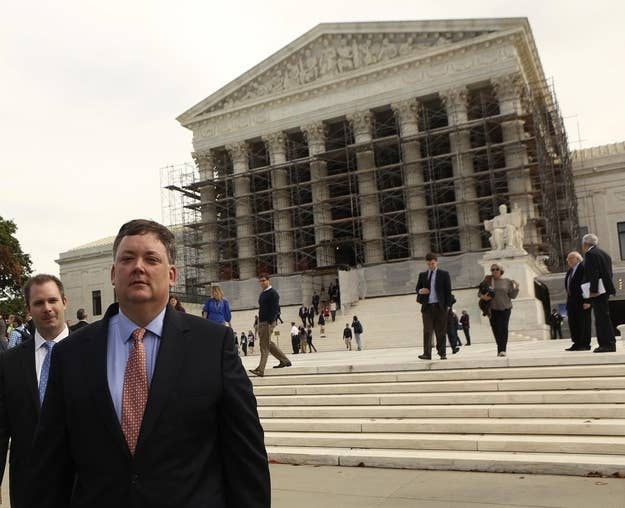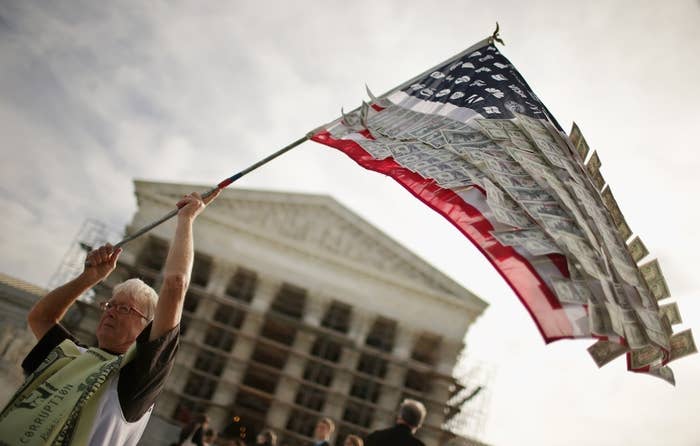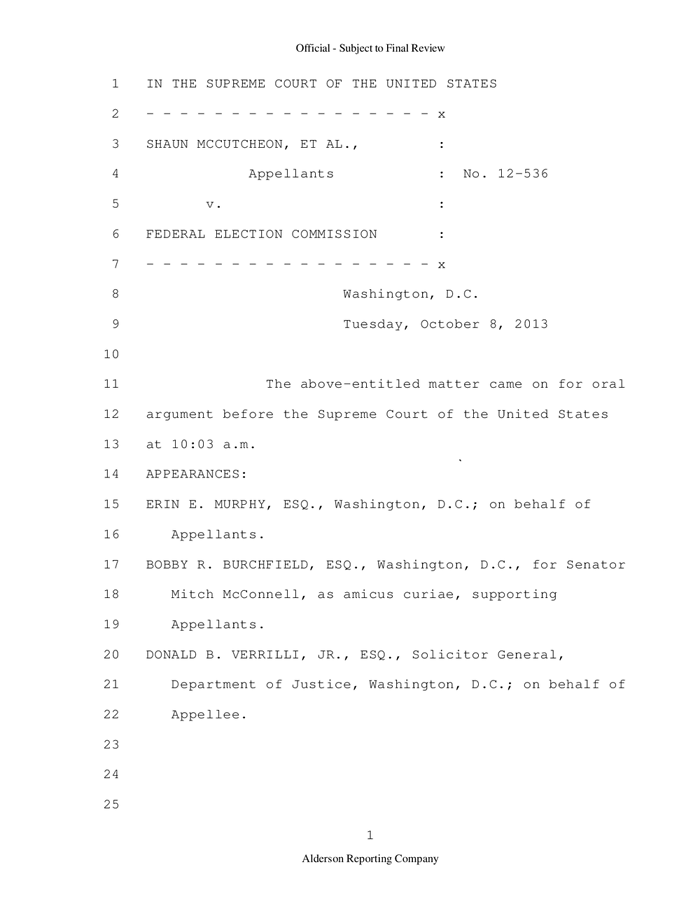
WASHINGTON — Chief Justice John Roberts found himself at the center of the dispute over the role of money in politics Tuesday, in a Supreme Court case that could open the door to an uprooting of the longstanding view that limits on campaign contributions are generally permissible.
Roberts presented himself as being in a conflicted position Tuesday, asking outright whether there was a middle ground that would avoid the First Amendment concerns pressed by the challengers to aggregate, or cumulative, campaign contribution limits and the corruption concerns that animated the critical 1976 case upholding significant campaign finance reforms. His eventual decision in Tuesday's case could prove pivotal, with at least three justices appearing settled solidly on each side of the dispute and the other two leaning pretty clearly on opposite sides of the case.
In federal elections, individuals are only allowed to give $5,200 per election cycle to a candidate's campaign. On top of that limit, however, there is a $48,600 aggregate limit on the amount a person can give to any candidates' committees. There also is a $74,600 aggregate limit to be given to non-candidate committees, like political parties. As the justices noted, this is a case about a rarified group of donors who can afford to go beyond those limits.
Shaun McCutcheon — one such wealthy Republican donor — and the Republican National Committee, has asked the Supreme Court to strike down those aggregate limits as constitutional. Going further, Sen. Mitch McConnell advised the court to eliminate the 1976 distinction between expenditures, which receive strict scrutiny in court challenges, and contributions, which are reviewed on a more lenient basis.
As McCutcheon and others left the court Tuesday, the questions left for the justices are whether, as McConnell argues, contribution limits should be subjected to the same strict scrutiny as faced by spending limits and, with that decided, whether the "narrower ways" advanced by McCutcheon's lawyer are enough to justify breaking down the barrier on challenges to contribution limits.
The lawyer representing the Federal Election Commission, Solicitor General Donald Verrilli Jr., started his arguments by stating clearly, "Aggregate limits combat corruption."
If all the aggregate limits were struck down, supporters of the limits press, a person could give roughly $3.6 million to candidates in one cycle. Opponents however, point to the other end of the spectrum, noting that the current aggregate limits mean that an individual cannot give the maximum individual contribution amount of $5,200 to even 10 candidates in an election, as that would go over the $48,600 limit.
Roberts asked Verrilli whether there was a way to avoid the "$3.6 million problem" without creating the "10th donor" problem. Verrilli responded that McCutcheon and the RNC's arguments wouldn't allow any middle ground, as they were arguing that aggregate limits are unconstitutional, not that they need to be modified.
The primary question raised about what would happen without aggregate limits is about how the funds would be used and whether they would be transferred to other candidates, raising concerns about donors circumventing the individual contribution limits to funnel money to one or a few candidates.
Secondly, Verrilli pressed concerns about, even before any funds are distributed, the potential corruption resulting from the receipt and delivery of the funds. Justice Elena Kagan explained this concern earlier in the arguments when talking with McConnell's lawyer, Bobby Burchfield, noting that the large checks sought by a joint fundraising committee often would be solicited by powerful members of the party, like the House speaker or the Senate majority leader, who then likely would treat that donor particularly well. As such, Verrilli later argued, the concerns about corruption are raised not just in where the money ends up but also in how the money is received.

Justice Samuel Alito — who appeared to share many of the concerns expressed by Justices Antonin Scalia, Anthony Kennedy and Clarence Thomas in past cases — was dismissive of Verrilli's arguments, calling the aggregate limits a "blunt" way of addressing the concerns. At the same time, Alito provided an opening for striking some but not all of the limits, saying that all of "these aggregate limits might not all stand or fall together."
Although just one seat down from Alito, Justice Elena Kagan laid out a repeated and forceful defense of the limits. She was joined at times by Justices Ruth Bader Ginsburg and Sonia Sotomayor. Incredulous at the prospect that a $3.6 million check wouldn't have a significant impact on elected officials, Kagan pressed McCutcheon's lawyer, Erin Murphy, and Burchfield on the point. Burchfield, for his part, responded that gratitude is not the same thing as corruption — a nod to reasoning in Kennedy's 2010 ruling striking down corporate and union campaign spending limits in Citizens United.
Ginsburg focused her questions on, as she put it, "the little people," and how supporters of aggregate limits maintain that they help promote democratic values by ensuring that more people can have a voice in elections — a point later echoed by President Obama in a news conference Tuesday afternoon.
"All of us should bind ourselves to some rules that say the people who vote for us should be more important than somebody who's spending a million dollars, $10 million, or a hundred million dollars to help us get elected, because we don't know what their agendas are," Obama told reporters.
Justice Stephen Breyer, although appearing sympathetic to that side of the issue, was focused — time and again at the argument — on whether the case itself had resolved the factual questions about what could happen with or without the aggregate limits. At one point, the one-time professor rattled off a series of issues that he believe remained to be "explore[d]," including questions about circumvention, infringement on First Amendment rights, and the role of independent expenditures.
Scalia, however, shared no such concerns about whether the justices knew enough to rule, asking at one point why they would need more of a record to rule on "issues of law." Additionally, while supporters of limits noted that people subject to the limits are still able to spend money supporting issues or candidates through independent expenditures, which would not be coordinated with any campaigns, Scalia actually pointed to that as another reason to treat aggregate limits skeptically because, he said it "seems fanciful" that a candidate would be more gracious for a big donation than for an independent expenditure spent in support of the candidate.
Roberts, who sided with his more conservative Supreme Court colleagues in Citizens United, focused his questions in court on finding middle ground — but also asking both sides if there were other methods, beyond the aggregate limits, of addressing the concerns raised by Verrilli and supporters of the limits.
McCutcheon's lawyer, Murphy, said at one point, "There are narrower ways to do this."

